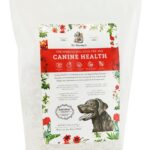The topic of raw food diets for dogs has garnered significant attention, prompting many pet owners to consider this feeding approach. While there’s undeniable public interest, it’s crucial to understand the potential health implications for both your canine companion and your family. As a leading authority, the American Veterinary Medical Association (AVMA) advises against feeding dogs and cats any raw or undercooked animal-sourced protein. This stance is rooted in the documented risks to both animal and human health.
The primary concern with raw food diets is the heightened risk of bacterial contamination. Animal-sourced proteins, including beef, poultry, pork, fish, eggs, and milk, can harbor harmful pathogens if not properly treated. Traditional methods like pasteurization and cooking to safe minimum internal temperatures are effective in eliminating these pathogenic organisms. These processes have long been the standard for ensuring food safety when dealing with animal-derived proteins. The AVMA acknowledges that scientifically proven alternative technologies can also achieve pathogen reduction, but the core principle remains: untreated animal-sourced proteins pose a risk.
Numerous peer-reviewed scientific studies and product recalls have highlighted the dangers of raw or undercooked animal-sourced proteins. These foods can be contaminated with a range of bacteria known to cause illness, such as Salmonella, Campylobacter, Clostridium, Escherichia coli, Listeria monocytogenes, and Enterotoxigenic Staphylococcus aureus. Dogs consuming contaminated raw food can develop foodborne illnesses. Alarmingly, even dogs that appear healthy can carry these pathogens without showing clinical signs, leading to subclinical infections. These apparently healthy animals can then shed these organisms, posing a significant risk to other animals and humans, particularly vulnerable populations like young children, the elderly, pregnant women, and individuals with compromised immune systems. Handling raw pet food also puts pet owners at direct risk of contracting these infections.
To minimize public health risks associated with pet feeding practices, the AVMA strongly recommends adhering to their guidelines on the safe handling of pet foods and treats. These guidelines provide essential steps to protect yourself and your pet.
It is important to note that the AVMA’s recommendation against raw animal-sourced protein does not extend to feeding unpasteurized milk from the same species to nursing young animals like puppies and kittens. This is a specific exception for naturally occurring feeding in very young animals.
For further information and safety alerts related to pet food, you can refer to resources on recalls and safety alerts provided by reliable veterinary and public health organizations. Prioritizing food safety is paramount for the well-being of both your pet and your household.

